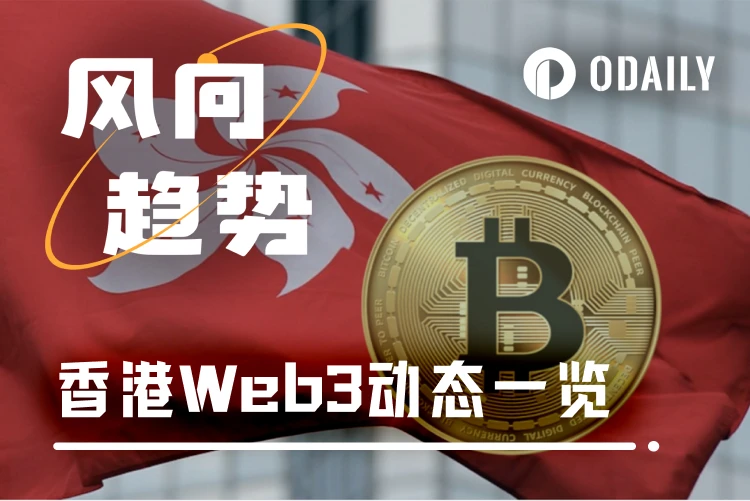Original | Odaily Planet Daily ( @OdailyChina )
Author | Dingdang ( @XiaMiPP )

Recently, a large number of crypto companies have announced that they will go public in the United States, and crypto investment institution Animoca Brands has also been exposed to be considering returning to the capital market. In response, the companys president Ouyang Qijun responded: Since the group delisted from Australia, it has indeed been evaluating new listing opportunities. He admitted that the US markets enthusiasm for IPOs of virtual asset companies has not diminished, but as a Hong Kong company, Animoca Brands still gives priority to local fundraising . He pointed out that the final listing time and location will depend on the overall market environment and the degree of cooperation of potential investors, and no final decision has been made yet.
This statement is not surprising. On the Web3 global capital map, Hong Kongs attractiveness is in the stage of being re-evaluated. In recent years, Hong Kongs regulatory framework has gradually become clear, providing digital asset companies with a relatively predictable compliance path. Compared with Singapore, which once had loose regulation but has tightened, Hong Kongs attitude appears to be more proactive. Especially after the Monetary Authority of Singapore (MAS) announced that all crypto companies would be included in the DTSP licensing supervision, many companies turned their attention back to Hong Kong: it is not only located in the core of the Asian market, but also retains a unique channel to connect with the global financial system. The adjustment of the policy environment, coupled with the dual advantages of geography and finance, has made Hong Kong competitive again in the migration of Web3 capital. For details, please refer to After Singapores expulsion, Hong Kong has become the East Asian Crypto-Friendly Capital? .
Regulation speeds up: Stablecoin regulations are implemented and policy declaration 2.0 is released
In 2025, Hong Kong has taken frequent actions in the regulation of crypto assets, and the pace of policy implementation has significantly accelerated.
On May 30, the Hong Kong SAR government officially published the Stablecoin Ordinance in the Gazette, announcing that the law will be officially implemented on August 1. This marks that Hong Kong has become one of the first jurisdictions in the world to establish a legal regulatory framework for stablecoins. According to the ordinance, only licensed institutions can sell stablecoins pegged to fiat currencies in Hong Kong, and only licensed issuers are allowed to provide such products to retail investors.
Secretary for Financial Services and the Treasury Christopher Hui said: “After the Ordinance comes into effect, the licensing regime will provide appropriate regulations for relevant stablecoin activities and is a milestone in promoting the sustainable development of Hong Kong’s stablecoin and digital asset ecosystem.”
At the 2025 Caixin Summer Summit, Hong Kongs Financial Secretary Paul Chan Mo-po said that Hong Kong has introduced a licensing system for digital asset trading platforms and a stablecoin licensing system , and is promoting regulatory arrangements for custody and over-the-counter transactions .
On June 26, Hong Kong issued the Hong Kong Digital Asset Development Policy Declaration 2.0 , which updated and continued the support for digital assets in the first version of the declaration in 2022. The new policy proposes four core directions, including:
Establish a clear regulatory framework, including a licensing mechanism for digital asset trading service providers and digital asset custody service providers.
Promote the tokenization of more assets , including precious metals, non-ferrous metals, renewable energy, money market funds (MMFs), and real-world assets (RWAs) such as government bonds.
Encourage the application of digital assets in payment, settlement and other scenarios , especially the potential of stablecoins as a payment tool.
Attract professional talents in the global digital asset field , promote cooperation with international institutions and enterprises, and enhance Hong Kongs competitiveness in the global digital asset ecosystem.
Ng Kit-chong, a member of the Legislative Council from the Election Committee sector, said that the Policy Declaration 2.0 has clear, ambitious and sustainable goals, and also has specific suggestions that can sort out the chaos that has occurred in digital assets in the past and help the development of the industry.
From policy clarity to practical implementation: Hong Kongs ecosystem is taking shape at an accelerated pace
Compared with the establishment of paper policies, the greater highlight in 2025 is that the policies begin to bear fruit. The interaction between the government, traditional financial institutions and Web3 companies is becoming more frequent, and a more three-dimensional picture of digital assets is unfolding.
First, in terms of institutional incentives, Hong Kong is working hard to open up the application path of tokenized assets in the real financial system. According to Caixin, the Hong Kong government plans to include tokenized ETFs in the stamp duty exemption , and cooperate with the compliant trading platform docking emphasized in the Policy Declaration 2.0 to provide substantial guarantees for the secondary market liquidity of this new product. Caitong Securities also disclosed on the platform that its subsidiary Caitong Hong Kong has obtained the qualification of virtual asset ETF agency trading.
Stablecoins are another frontline where policies are gradually loosening. Xiao Feng, chairman of HashKey Group, revealed that stablecoin licenses issued by Hong Kong in the future will not be limited to Hong Kong dollar pegs , and other fiat currencies or multi-chain issuances (such as Ethereum, Solana, and self-built chains) will also be considered. This dual opening of networks and currencies highlights Hong Kongs inclusiveness in technology paths and provides greater room for imagination for local and international projects.
Traditional brokerage firms enter the market: Compliance trading channels gradually take shape
Guotai Junan announced on June 24 that it had officially obtained approval from the Hong Kong Securities and Futures Commission to upgrade its existing securities trading license to provide virtual asset trading services and related advice. After the upgrade, customers can directly trade cryptocurrencies such as Bitcoin and Ethereum and stablecoins such as Tether on its platform. After the news came out, Guotai Junans stock price rose by more than 150% within a day.
Sources revealed that many local brokerages in Hong Kong (such as Shengli Securities and Aide Securities) have completed the No. 1 license upgrade , and Guotai Junan International is not the only Chinese brokerage to apply for such a license. In the future, more institutions may enter the market for compliant crypto trading services.
The business carried out by the above-mentioned securities firms is a distribution trading service, not a proprietary exchange model. It mainly provides compliant trading channels for mainstream currencies such as BTC and ETH by setting up an omnibus account in a licensed exchange, and does not involve high-risk altcoins.
It is reported that the virtual asset-related licenses of the Hong Kong Securities and Futures Commission include the following categories: operating a virtual asset trading platform, managing an investment portfolio with more than 10% investment in virtual assets, providing virtual asset trading services through comprehensive account arrangements, providing advice on virtual assets, and acting as an introducing agent for virtual asset trading platforms .
Tianfeng Securities stated on the interactive platform that its wholly-owned subsidiary Tianfeng International Securities and Futures Co., Ltd. has been approved by the Hong Kong Securities and Futures Commission to obtain the third type of virtual asset-related license, and can provide virtual asset trading services through comprehensive account arrangements.
Hong Kong Financial Secretary Paul Chan said in a speech at a forum on June 21: We embrace the development of digital assets. We have issued 10 virtual asset platform licenses and another 8 applications are under review. He also stressed that Hong Kongs legal and regulatory framework is being improved at an accelerated pace to lay a long-term institutional foundation for the digital financial ecosystem.
Industrial support policies are implemented, and the Web3 entrepreneurial ecosystem is emerging
In terms of industry support, Hong Kong also made moves. Hong Kong Cyberport announced the launch of a blockchain and digital asset pilot funding program to promote the development and testing of blockchain and Web3.0 applications. The program is now open for application, and the application deadline is August 1, 2025. Each eligible company can apply for up to 3 pilot projects, with a maximum funding of HK$500,000 for each project. The main areas of focus are: RWA tokenization, payment and stablecoins, decentralized identity, social innovation and digital experience, and decentralized artificial intelligence/machine learning.
Professional service organizations have also begun to systematically participate in industry planning. PwC, one of the Big Four accounting firms, and industry organization Web3 Harbour released the Hong Kong Web3 Blueprint , building a strategic framework around the five dimensions of talent, infrastructure, standards, supervision, and capital. Peter Brewin, partner of PwC Hong Kong, announced that five action groups will be launched in August, focusing on stablecoins, fund management, VATP platform, compliance laws and OTC trading, and strive to promote the implementation of the Web3 industry policy + execution synergy closed loop.
Hong Kong Financial Secretary Paul Chan Mo-po published an essay in which he pointed out that as of the end of March this year, the number of registered funds in Hong Kong reached 976 , with a net inflow of more than US$44 billion year-on-year, an increase of 285% . The two major innovation and technology flagships of Hong Kong Science Park and Cyberport have nurtured and supported 22 listed companies and 20 unicorn companies. Even though the current non-residential property market is still weak, senior investors have bought a whole commercial building in Tin Hau as a gathering point for the development of the Web3 ecosystem, grasping Hong Kongs new development in Web3. Web3 companies have successively leased office buildings in Hong Kong to conduct business, and it is estimated that these demands will continue to appear.
Conclusion: Strategic coordinates in the making
Hong Kongs transformation is not only the result of institutional evolution, but also an active exploration of its future positioning. Whether it is the official implementation of the Stablecoin Ordinance, the iteration of the regulatory declaration, or the gradual access of securities firms, funds, and the innovation and technology ecosystem, it shows that Hong Kong is striving to gain an irreplaceable position in the global digital asset order.
But this reconstruction is still ongoing. There are still many variables between the market, technology and policy that are not clear. Whether Hong Kong can truly fulfill its promise as the Asian Crypto Financial Hub requires time, endurance and the support of continuous policy coordination.
At least now, the city has sent a clear enough signal: it does not want to miss this opportunity to reshape the technological and financial order. The question left for the market is: this time, are you willing to bet on Hong Kong?










